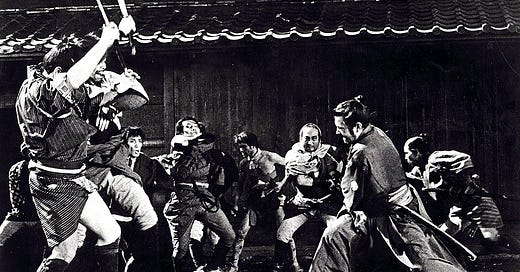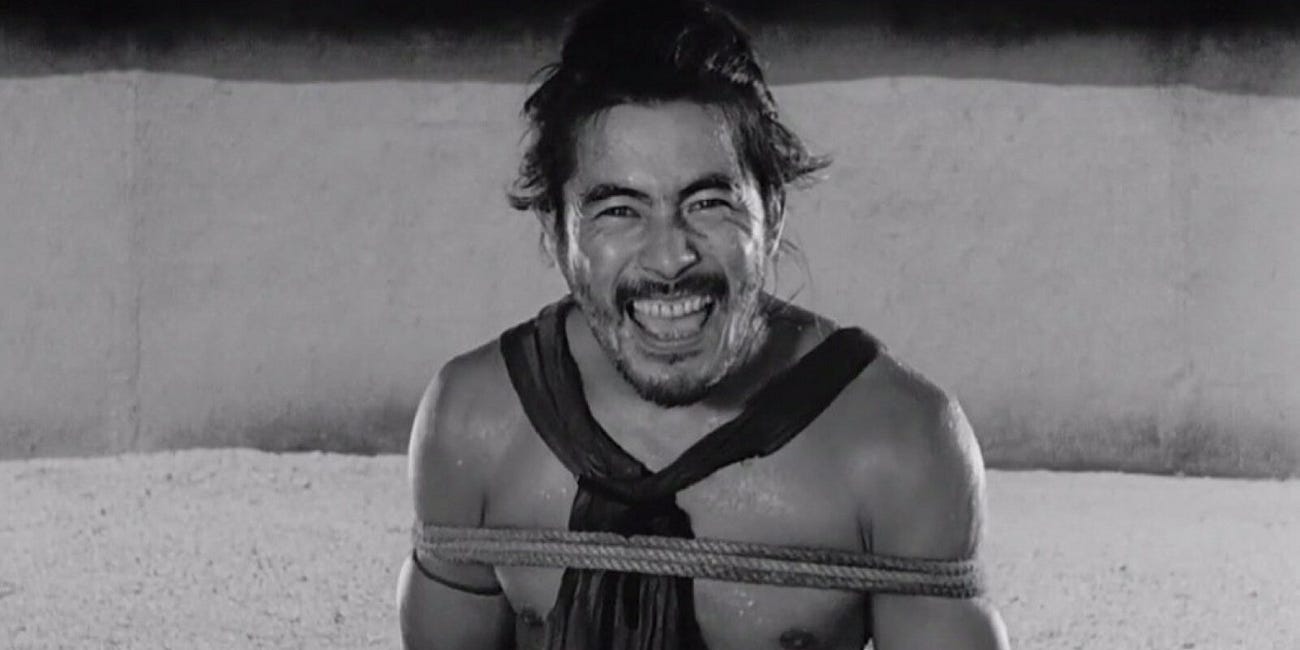Spoilers for Yojimbo (1961)
When legendary director Akira Kurosawa directed Yojimbo, released in 1961, there was already a symbiotic relationship between his work and the Hollywood system.
Arguably his best film – almost certainly his most well-known – Seven Samurai (1954) had been influenced by the classic westerns and would be completely remade into a western in the guise of John Sturges’ 1960 film The Magnificent Seven (Seven Samurai was released in America under this title, making Sturges’ film more clearly a remake).
Yet moving into the 1960s and 70s, Kurosawa’s influence would be more keenly felt across the globe. Yojimbo is a clear precursor to the spaghetti western, with the amoral outsider coming into town and taking on the gangs that have taken power.
Sergio Leone took so much from the film for the 1964 film A Fistful of Dollars that the Toho Company successfully sued, leading to the acknowledgement that the Man with No Name’s first outing was a remake. No surprise, that Sergio Corbucci’s Django (1964) which was made to rival Leone’s film, also takes liberally from Kurosawa.
What’s interesting is that Yojimbo feels like a film in which Kurosawa laments the end of an era. An admission that the genre in which he had made some of his most famous films was falling out of fashion. After Yojimbo, the director would make only one more samurai film – a direct sequel, Sanjuro (1962) – and while he would move back into period dramas, his most famous works after this, Kagemusha (1980) and Ran (1985), would be much grander in scale.
Everything about Yojimbo feels like a farewell to a genre that brought about Seven Samurai, Rashomon (1950) and Throne of Blood (1957). Set at the end of the Edo period, it depicts a time when samurai were less in demand, and the introduction of the yakuza and more capitalist enterprises were changing the way of life in Japan.
RASHŌMON
Spoilers for Rashōmon (1950). Trigger warnings for discussion of sexual assault and suicide.
To this end, Sanjuro (Toshiro Mifune) is shown to be without a master and near destitute, having to beg for food and drink from the local tavern owner (Eijirō Tōno) when he arrives in town. In the opening moments, Kurosawa sets out that this way of life (perhaps we could read this as the genre itself) is no longer sustainable.
There were also non-cinematic changes to take into account, and the director acknowledged the growing influence of television. There’s something to be said that in Yojimbo, the changing lifestyle consists of small farmers losing their sons to gambling dens – before he reaches the town, Sanjuro comes across a young man claiming he’s going to make his money gambling instead of scratching around on the farm – whereas Kurosawa himself saw that less people were interested in the cinema, and were choosing to stay inside and watch television.
In both cases, it marks a significant shift between generations.
While Kurosawa had taken influence from the heyday of the American western, he could see that the cycle was rotating back away from his distinct period dramas back to something else. Could he have predicted the rise of westerns again through the morally grey, ultra-violent European productions? Or perhaps the resurgence of sci-fi thanks to Star Wars (George Lucas, 1977), itself influenced by Kurosawa’s The Hidden Fortress (1958)?
Perhaps not, but he knew a change was coming and this is clear in the choice of antagonist. After Sanjuro enters the town and sets about adding fuel to the fiery rivalry between the two gangs that have taken control, he comes across Unosuke (Tatsuya Nakadai). Unosuke is the brother of gang leader Ushitori (Kyū Sazanka) and hides a revolver in his robes.
As a character, he stands out in the film due to his rejection of tradition. His sword is more of a prop than a weapon, and he revels in waving his gun around to threaten the locals. Much like the period indicates that the samurai were no longer required, the inclusion of Unosuke shows us why. New weaponry meant that battles could be fought at a distance.
At the end of the film, Unosuke falls to the sword skill of Sanjuro but the shots fired were not really at our anti-hero but at the genre itself. If we can extrapolate, Kurosawa would have seen the resurgence of westerns in the West, as well as examples from contemporaries such as Seijun Suzuki, and would have seen the influence of his own films on those. Unosuke both predicts the end of the samurai genre, while also cheekily noting the influence of samurai films on it.
But his decision to step away from the genre is tinged with sadness. The gloomy, ironic ending to the film, in which Sanjuro leaves the ruined town, stating that it will be peaceful now, suggests that Kurosawa felt that there was little left in samurai films. After the sequel, his filmmaking would flit between genres before returning to the period epics 20 years later.
Director: Akira Kurosawa
Writers: Ryūzō Kikushima, Akira Kurosawa, Hideo Oguni
Starring: Toshiro Mifune, Tatsuya Nakadai, Yoko Tsukasa, Isuzu Yamada, Daisuke Katō, Takashi Shimura, Kamatari Fujiwara, Atsushi Watanabe










